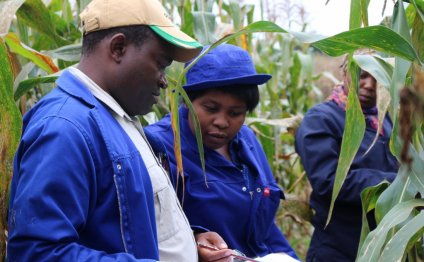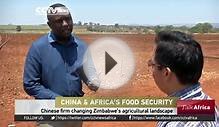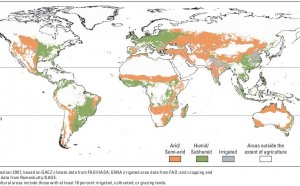
Africa Agriculture News
Does China' engagement with African agriculture represent Africa's biggest opportunity in history? Africa's management of this engagement will be critical to maximising the opportunities and minimising the challenges that China presents.
Agriculture is central to African development, currently generating 40 percent of gross national product (GNP). It constitutes 40 percent of Africa's exports and 70-80 percent of employment. However, African agriculture is in decline. From 1960 to 2005, the grain yield increased by only 60 percent. In comparison, the grain yield in East Asia increased by 220 percent in the same period. Africa's food production per capita declined by 15 percent from 1960 to 2005 and Africa's share in world agricultural exports also declined from 15 percent to 3 percent in this period. Africa went from being a net exporter of agricultural goods in the early 1960s to a net importer of agricultural goods in the 2000s, spending USD 33 billion on agricultural imports by 2006. In addition, there has been widespread degradation of the soil and natural vegetation. An acute lack of skills and political neglect has left African agriculture largely untapped. African governments and donors have scaled back expenditures on agriculture in the last three decades, with African governments reducing their budget allocations for agriculture from 7.3 percent in the 1980s to 3.8 percent in 2000, and donors scaling back from 18 percent to 3.5 percent in the same time frame. Africa needs to reverse this decline.
Throughout this period, China has been engaged in African agriculture. The nature of China's engagement is complex. It started as an instrument of diplomacy to counter Taiwan. The government of the People's Republic of China reclaimed its recognition at the United Nations (UN) partly through the votes of African countries. It has also insisted on the One-China policy, encouraging diplomatic recognition of the government in Beijing and the denial of the same to the government in Taipei as a separate nation state. The One-China policy remains central to China's engagement with Africa today. China has now emerged as a major donor-investor in Africa. Could China prove significant in reversing African agricultural decline?
China is Africa's strategic development partner
China has a significant presence in trade and national development cooperation on the continent. It has articulated its interest in the framework of the One-China policy, which sets forth the tenet of south-south cooperation based on respect for national sovereignty, national interest, non-intervention and non-imposition of conditionalities. This policy framework emphasises mutuality, trust, partnership and win-win cooperation. In 2012, China became Africa's largest trading partner, with USD 200 billion of trade. China sees its approach in Africa as novel and revolutionary. This approach, informed by China's own experience of national development and transformation, is being presented to African nations as a model. Using this approach, China has reduced poverty in its own population from more than 60 percent to less than 7 percent since 1978, thereby eradicating more poverty than any other state in the whole of human history.
But, China also has its own food security needs. The Food and Agriculture Organization of the United Nations (FAO) has determined that food production will need to increase by 70 percent to meet the world's increasingly urbanised and affluent population. This food demand is coming primarily from the rapidly advancing highly populated emerging economies. At the moment, China, the second largest food consumer in the world, is meeting domestic demand from its diminishing local resources in arable land and irrigable water. Therefore, Africa, which is abundant in these resources, may factor prominently into China's long-range plan to address its food security needs. There has been a pronounced growth in demand for African agricultural commodities from China. Chinese leaders are careful to note that raising the level of African agricultural productivity is in the interest of the whole world. The Chinese see their role in African agriculture as helping to address global food security needs.
China's coopration in African agriculture
Until relatively recently, China's partnership in African agriculture was focused on technical assistance and capacity building. However, in the interest of sustainability, the development of markets and the potential for expanded trade, China has encouraged public-private partnerships and provided incentives for its agribusiness corporations to invest in African agriculture. The business and investment components of this new approach are linked to China's "Going Global" strategy.
China's approach to Africa is still bilateral aid-based. But, increasingly, China has been willing to participate in multilateral and regional arrangements. Chinese aid is now packaged with trade and investment, involving various state and private actors. Present Chinese policy is to prioritise local food security and market stability in Africa. At the end of the 1980s, a quarter of Chinese total aid to Africa was toward agriculture. China's support for the outward expansion of the agriculture sector is still minimal - USD 190 million or 0.9 percent of total outward investment in 2006 compared with USD 8.5 billion invested in resource extraction. From the poorest African countries, China has expanded the list of commodities allowed duty free into China from 190 to 440.
In the 1960s and 1970s, China built more than 80 demonstration farms, covering a total of 45, 000 hectares. The focus then was on technology transfer and training. By 2009, China had carried out 200 agricultural projects, established 23 fisheries, stationed 1, 100 Chinese agricultural experts in various parts of Africa, established 11 agricultural research stations and initiated 60 agricultural investment projects. Most of the investment projects were initiated by large to medium-sized state-owned Chinese farming groups. But, smaller Chinese private firms and individuals have also secured new opportunities in Africa. From 2003 to 2008, more than 4, 000 Africans travelled to China for agriculture-related courses lasting from three weeks to three months.
RELATED VIDEO



Share this Post
Related posts
Africa Agriculture Facts
African smallholder farmers are the people that feed Africa – but struggle to feed themselves. How is this possible? Our…
Read MoreComprehensive Africa Agriculture Development Programme
The Comprehensive Africa Agriculture Development Programme (CAADP) is Africa’s policy framework for agricultural transformation…
Read More










